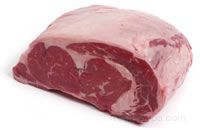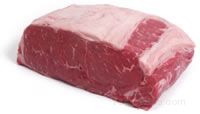How Long to Roast 3kg Beef
Roast beef has always been a favorite dinnertime entrée. A flavorful roast beef is not difficult to cook, but there are a few important considerations to remember to ensure a good result. The following four points should be considered when you want to cook a delicious beef roast.
- The type of beef roast
- The size of the beef roast
- The beef roast cook times
- The roasting temperature
| First, let's consider the type of beef cut to use for your roast. Since roasting is a dry heat cooking method, you should use beef cuts that are tender and well marbled. Tougher beef cuts with less marbling tend to dry out much more quickly (although when the proper steps are followed, excellent results can be achieved). A beef roast cut from the rib or loin section is often the best choice; for example, try a rib-eye roast if your goal is to serve a top quality roast with lots of flavor. The rib-eye roast refers to a rib roast in which the 6th through the 12th rib bones have been removed leaving just the rib-eye muscle. When the bones are not cut away from this roast, it is known as a standing rib roast. Both of these roasts are ones that you probably wouldn't cook with any frequency, because both are quite expensive, but the tenderness and flavor of the rib-eye roast and the standing rib roast are tough to beat. | Rib-eye Roast |
|
| Top Loin Roast |
| Also found in the short loin primal cut is the tenderloin, which is the inside muscle of the short loin. It is the most expensive cut of beef and can be roasted whole or it can be cut into tender, boneless steaks. The tenderloin roast is also known by the following names:
Both the top loin roast and the tenderloin roast are often cooked quickly at high heat, which seals in the juices. Both beef roasts are usually cooked to no more than medium doneness to ensure that the meat remains tender and moist. | Tenderloin Roast |
Of course, the size of the beef roast is very important in determining the length of time required to cook the roast. It is often easiest to cook a roast using a predetermined length of cook time per pound. That way, you can cook any size beef roast by simply multiplying the cook time per pound by the number of pounds that the roast weighs.
The oven temperature used to cook a beef roast is usually set somewhere between 300 degrees and 450 degrees Fahrenheit. The recommended cooking temperature for your roast is usually determined by the type of beef cut that you plan to roast. Some beef roasts are best when slow roasted at lower temperatures, while other roasts are best when cooked quickly with high heat. There are even a few beef roasts, especially some of the tougher roasts from the round or chuck, that are best when cooked with high heat at the start (to sear the outside of the meat and seal in the juices) and then cooked at a lower temperature to finish the roast.
The cook time and temperature are not only determined by the type of beef roast but also by such considerations as the amount of marbling within the beef roast, the amount of outer fat covering the roast, and whether or not the roast is boneless. And, because there are a number of considerations that determine the proper cook time and temperature, a cooking times chart should be used only as a guideline and not as an absolute. The best method for determining the desired doneness of a beef roast is with the use of a reliable meat thermometer.
BEEF Cooking Times and Temperatures | |||||||
Oven Baked or Roasted Beef | |||||||
| Beef Cut | Oven Temperature | Weight (pounds) | Approximate Cooking Time (minutes per pound or as indicated) | ||||
| Rare (140°F) | Medium-rare (145°F) | Medium (160°F) | Medium-well (165°F) | Well Done (170°F) | |||
| Standing rib roast (Prime Rib): | Roast at 450°F for 15 min. then finish at 325°F for times shown below | Rare (120 - 125°F) | Medium-rare (130 - 135°F) | | | | |
| | 325°F | 6-8 lbs. | 1 1/4 - 1 1/2 hrs. | 1 1/2 - 1 3/4 hrs. | | | |
| | 325°F | 8.5-10 lbs. | 1 1/2 - 2 hrs. | 1 3/4 - 2 1/4 hrs. | | | |
| | 325°F | 10.5-13 lbs. | 2 - 2 1/2 hrs. | 2 1/4 - 2 3/4 hrs. | | | |
| | 325°F | 14-16 lbs. | 2 1/2 - 3 hrs. | 3 - 3 1/2 hrs. | | | |
| | 325°F | 16.5-18 lbs. | 3 - 3 1/2 hrs. | 3 1/2 - 4 hrs. | | | |
| Rib roast (chine bone removed) | 350°F | 4-6 lbs. | 1 1/4 - 1 3/4 hrs. | 1 3/4 - 2 1/4 hrs. | 2 1/4 -2 3/4 hrs. | 2 3/4 - 3 1/4 hrs. | 3 1/4 - 3 3/4 hrs. |
| 6-8 lbs. | 1 3/4 - 2 1/4 hrs. | 2 1/4 - 2 3/4 hrs. | 2 3/4 -3 1/4 hrs. | 3 1/4 - 3 3/4 hrs. | 3 3/4 - 4 1/4 hrs. | ||
| Rib eye roast: | | | | | | | |
| | 350°F | 4-6 lbs. | 1 1/2 - 1 3/4 hrs. | 1 3/4 - 2 hrs. | 2 - 2 1/2 hrs. | 2 1/2 - 3 hrs. | 3 - 3 1/2 hrs. |
| | 350°F | 4-6lbs. | 1 3/4 - 2 hrs. | 2 - 2 1/2 hrs. | 2 1/2 - 3 hrs. | 3 - 3 1/2 hrs. | 3 1/2 - 4 hrs. |
| Eye round roast | 325°F | 2-3 lbs. | 1 1/4 - 1 1/2 hrs. | 1 1/2 - 1 3/4 hrs. | 1 3/4 - 2 hrs. | 2 - 2 1/4 hrs. | 2 1/4 - 2 3/4 hrs. |
| Round tip roast | 325°F | 3-4 lbs. | 1 1/2 - 1 3/4 hrs. | 1 3/4 - 2 hrs. | 2 - 2 1/2 hrs. | 2 1/2 - 3 hrs. | 3 - 3 1/2 hrs. |
| 6-8 lbs. | 2 1/4 - 2 1/2 hrs. | 2 1/2 - 3 hrs. | 3 - 3 1/2 hrs. | 3 1/2 - 4 hrs. | 4 - 4 1/2 hrs. | ||
| Sirloin tip | 300-325°F | 3 1/2-4 lbs. | 35 min. | 36 min. | 38 min. | 39 min. | 40 min. |
| Rolled rib | 300-325°F | 5-7 lbs. | 32 min. | 35 min. | 38 min. | 43 min. | 48 min. |
| Rolled rump | 300-325°F | 4-6 lbs. | 25 min. | 26 min. | 28 min. | 29 min. | 30 min. |
| Whole tenderloin | 425°F | 4-5 lbs. | 45-60 min. total | 50-60 min. total | 60-70 min. total | | |
| Half tenderloin | 425°F | 2-3 lbs. | | 35-40 min. total | 45-50 min. total | | |
| Meatloaf | 350°F | 1 1/2 lbs. | | | 75 min. total | | |
| Note: Start with meat at refrigerated temperature. Remove the meat from the oven when it reaches 5° to 10°F below the desired doneness; the temperature will continue to rise as the meat stands. | |||||||
Remember, use the roast cook times in this chart as a guide only. The oven temperatures and roast cook times listed here are accurate enough to provide you with good results; however, it is important to keep in mind that a number of variables can make a difference when using these guidelines to cook your roast. You must consider the differences in ovens, whether or not the roast is placed into the oven directly from the refrigerator, the use of an oven cooking bag, and even the altitude of where you live—all of these can change the cook times for a beef roast by a significant margin.
Note: See the article, "Beef Cooking Times," for additional cook times and temperatures for a variety of other beef roasts, steaks, and ground products.
Source: https://www.recipetips.com/kitchen-tips/t--1542/roast-beef-cook-time.asp



0 Response to "How Long to Roast 3kg Beef"
Post a Comment